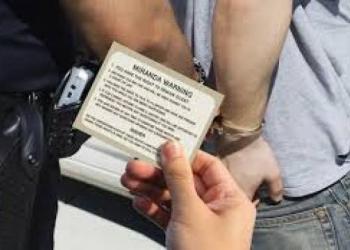
Questioning a Detained Suspect and the Necessity for a Miranda Admonishment and Wavier
Whether or not a person is in custody for purposes of Miranda depends upon the totality of the circumstances. Evidence seized as the product of a Miranda violation does not necessitate its suppression. A consent to search must be freely and voluntarily obtained to be legally valid.
In November, 2016, defendant Julian Mora-Alcaraz went to the home of his estranged wife, Geneva, and their seven-year-old son, for the apparent purpose of accosting her new boyfriend. During the confrontation, defendant brandished a semi-automatic firearm of some sort (not described in the written decision). Things apparently cooled down to the point where defendant was allowed to stay the night, sleeping on the couch. The next morning, defendant left Geneva’s house with their son, apparently with her permission, taking him to a nearby shopping mall. Although not defendant’s biological son, defendant and the boy had a close father-son relationship. That same morning, Officer Jackins of the Reno, Nevada, Police Department took a report concerning the domestic disturbance from the night before, including the fact that defendant had brandished a firearm. Officer Jackins called defendant via his cellphone and asked him to meet him at the mall in front of a sporting goods store so they could talk about the events from the evening before, and to do a welfare check on the child. Defendant agreed. When Officer Jackins arrived at the store, he came with three other armed, uniformed, officers, in two police cars (apparently with amber lights flashing). Contacting defendant in front of the sporting goods store as planned, Officer Jackins asked to speak with defendant away from the boy, and defendant agreed. Two of the officers therefore escorted the boy to the entrance of the store, and then inside because the boy was cold. Officer Jackins asked defendant about the events from the night before, the questioning being in what Officer Jackins later described as a low-key discussion; i.e., a technique he referred to as a “kill them with kindness” approach. During the ensuing conversation, a cooperative defendant admitted to Officer Jackins that he was in the country illegally. He also admitted to having the gun he’d brandished the night, which he kept in his truck. Defendant agreed to let Officer Jackins see the gun. Officer Jackins drove defendant across the parking lot to defendant’s pickup truck. Officer Jackins seized the gun from defendant’s truck, promptly arresting him for being an alien in possession of a firearm; a violation of 18 U.S.C. §§ 922(g)(5)(A) and 924(a)(2). At no time during this encounter was defendant advised of his Miranda rights. After being indicted in federal court, defendant filed a motion to suppress the firearm as well as his statements. The district court judge ruled that defendant had in fact been subjected to a custodial interrogation without the benefit of a Miranda advisal and waiver, and that his statements to Officer Jackins were therefore inadmissible. Finding that defendant’s statements as made to Officer Jackins “may have led to (defendant’s) consent to search,” the gun was also suppressed. The Government appealed.





